Fleurs du Mal Magazine



Little And Good
Young Thompson was a bit too short,
But hard as nails and level-headed,
And in his soul the proper sort
Of dogged pluck was deeply bedded ;
To join the ranks he almost ran,
But saw the weedy supersede him ;
Though he was every inch a man,
His country didn’t need him.
He read each passionate appeal
On wall and window, cab and cart ;
How impotent they made him feel !
He tried once more, though sick at heart.
In vain ! He saw the sergeants smirk ;
He argued, but they would not heed him ;
So sullenly trudged back to work
His country didn’t need him.
But, now the standard height’s curtailed,
Again he goes to join the ranks ;
Though yesterday he tried and failed
To-day they welcome him with thanks.
Apparently, he’s just as small,
But since his size no more impedes him,
In spirit he is six foot tall
Because his country needs him.
Jessie Pope
(1868 – 1941)
Little And Good
From: War Poems
• fleursdumal.nl magazine
More in: *War Poetry Archive, Archive O-P, Pope, Jessie, WAR & PEACE

Het Aardbeienveld
L.T.
En in alle vroegte
in het doorscheurende licht,
bleken we alleen en waaiden open,
waren onbegroeid en knielden
op het nog natte stro tussen het loof
en roken alsof we geen ogen hadden.
We drukten de rijpste in elkaars nek
en op de buik en lager, steeds harder
en hijgden zonder te begrijpen
want bleven sindsdien onvindbaar.
Vijftig jaar later schrap ik talg en eelt,
neem ik alsnog wat jij had durven geven,
bevend op een jongen,
verloren starend in het getande blad.
Albert Hagenaars
Verboden Terrein
Gedichten
# new poetry
by Albert Hagenaars
Pelgrimsgrond
Gedichten
Uitgeverij In de Knipscheer
ISBN 978-94-93214-32-3
84 pagina’s
Prijs ca. € 17,50
Verschijnt begin 2022
• Albert Hagenaars (Bergen op Zoom, 1955) was aanvankelijk werkzaam als beeldend kunstenaar en galeriehouder. Hij studeerde Nederlands en bracht veel tijd in Frankrijk door. In 1980 koos hij voor de literatuur. Werk van zijn hand verscheen in talrijke bladen en bloemlezingen, waaronder Maatstaf, De Tweede Ronde, Literair Akkoord, Raster, Poëziekrant en ‘De Nederlandse poëzie van de negentiende en twintigste eeuw in 1000 en enige gedichten’. Behalve gedichten, romans en vertalingen schrijft hij ook kritieken over literatuur en moderne beeldende kunst voor tal van bladen. Hagenaars werkt vaak samen met kunstenaars en musici en ook met collega’s uit andere taalgebieden. Enkele van zijn boeken werden vertaald; in het Duits, Frans, Indonesisch en Roemeens. Enkele componisten maakten muziek bij werk van Albert Hagenaars. Hagenaars maakte veel reizen, door o.a. de Verenigde Staten, Latijns-Amerika en het Verre Oosten. De laatste jaren woont hij deels in Indonesië, het geboorteland van zijn vrouw, Siti Wahyuningsih, met wie hij al ruim 200 Nederlandstalige gedichten van bekende en onbekende auteurs in Bahasa Indonesia vertaalde en publiceerde. Begin 2022 verschijnt een nieuwe bundel: Pelgrimsgrond bij Uitgeverij In de Knipscheer (meer informatie op website: www.alberthagenaars.nl)
• fleursdumal.nl magazine
More in: - Book News, Archive G-H, Archive G-H, Hagenaars, Albert

Vliegers die niet opgaan
Heus niet een ieder lijkt omzeilen van liegen
gegeven. Sommigen verhalen over waarheid
zo vaak dat ze vergeten wat zij wil. Hunkeren
naar klaarheid vergt uitleg, een introductie
op tomeloos mijmeren. Op varianten zonder
schroom. Nergens is begenadiging in zicht.
Bert Bevers
•bij het werk van Ron Scherpenisse
Uit: Varianten zonder schroom, Heren Met Hoeden, Bergen op Zoom, 2021
•fleursdumal.nl magazine
More in: Archive A-B, Art & Literature News, Bevers & Scherpenisse, Bevers, Bert, Illustrators, Illustration
Mary Shelley verblijft op haar veertiende bij een familie in Schotland, waar een innige vriendschap ontstaat met Isabella Baxter.
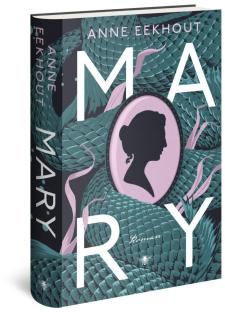 Samen dwalen ze in het gebied dat al eeuwen verhalen herbergt over monsters en geesten, en op een dag stuiten ze diep in het bos op een man die geen man is. De ledematen log en lelijk, een hoofd dat noch menselijk, noch dierlijk is.
Samen dwalen ze in het gebied dat al eeuwen verhalen herbergt over monsters en geesten, en op een dag stuiten ze diep in het bos op een man die geen man is. De ledematen log en lelijk, een hoofd dat noch menselijk, noch dierlijk is.
Vier jaar later brengt Mary met haar geliefde Percy Shelley een bezoek aan haar vrienden John Polidori en Lord Byron, bij het Meer van Genève. ’s Avonds bij het haardvuur vertellen ze elkaar verhalen. Een flintertje herinnering brengt haar terug naar haar tijd met Isabella in Schotland, en ook naar David Booth, een zeer intelligente, charismatische, maar tegelijk ook griezelige man, die een grote interesse in Mary en Isabella ontwikkelde. Dan dient ook het monster uit het bos zich weer aan, en vanuit die gedachte ontstaat haar verhaal over het monster van Frankenstein.
Mary is een ode aan de verbeelding, een verhaal over creëren, over de onlosmakelijke band tussen fantasie en werkelijkheid. En evenals Mary Shelley toont Anne Eekhout de kracht van een vrouw wanneer die iets ter wereld brengt wat niemand voor mogelijk had gehouden.
Anne Eekhout debuteerde in 2014 met de roman Dogma, die werd genomineerd voor de Bronzen Uil voor het beste debuut, op de longlist stond van de AKO Literatuurprijs en die wordt vertaald in het Duits. In 2016 verscheen Op een nacht (genomineerd voor de BNG Literatuurprijs) en in 2019 Nicolas en de verdwijning van de wereld, dat de prijs voor het Beste Boek voor Jongeren won. In november 2021 verschijnt de roman Mary waarin met verbluffende verbeeldingskracht de achttienjarige schepper van het meesterwerk Frankenstein tot leven wordt gewekt.
# new novel
Mary
Auteur: Anne Eekhout
Type: Gebonden
ISBN: 9789403153315
NUR: 301
Aantal pagina’s: 384
Uitgever: De Bezige Bij
Verschijningsdatum: 18-11-2021
Prijs: 24,99
• fleursdumal.nl magazine
More in: #Biography Archives, - Book News, - Bookstores, Archive E-F, Archive S-T, Byron, Byron, Lord, Keats, Keats, John, Mary Shelley, Percy Byssche Shelley, Shelley, Shelley, Mary, Shelley, Percy Byssche
Is there an alternative to capitalism? In this landmark text Chomsky and Waterstone chart a critical map for a more just and sustainable society.
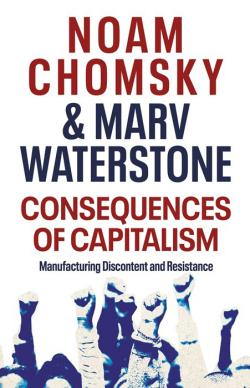 Covid-19 has revealed glaring failures and monstrous brutalities in the current capitalist system. It represents both a crisis and an opportunity. Everything depends on the actions that people take into their own hands.’
Covid-19 has revealed glaring failures and monstrous brutalities in the current capitalist system. It represents both a crisis and an opportunity. Everything depends on the actions that people take into their own hands.’
How does politics shape our world, our lives and our perceptions? How much of ‘common sense’ is actually driven by the ruling classes’ needs and interests? And how are we to challenge the capitalist structures that now threaten all life on the planet?
Consequences of Capitalism exposes the deep, often unseen connections between neoliberal ‘common sense’ and structural power. In making these linkages, we see how the current hegemony keeps social justice movements divided and marginalized. And, most importantly, we see how we can fight to overcome these divisions.
Is our “common sense” understanding of the world a reflection of the ruling class’s demands of the larger society? If we are to challenge the capitalist structures that now threaten all life on the planet, Chomsky and Waterstone forcefully argue that we must look closely at the everyday tools we use to interpret the world. Consequences of Capitalism make the deep, often unseen connections between common sense and power. In making these linkages we see how the current hegemony keep social justice movements divided and marginalized. More importantly, we see how we overcome these divisions.
“Covid-19 has revealed glaring failures and monstrous brutalities in the current capitalist system. It represents both a crisis and an opportunity. Contests for controlling the narratives around the meaning of this pandemic will be the terrain of struggle for either a new, more humane common sense and society or a return to the status quo ante. The outcome of those contests is uncertain; everything depends on the actions that people take into their own hands.” (From the Afterword)
Noam Chomsky was born in Philadelphia, Pennsylvania, on December 7, 1928. He studied linguistics, mathematics, and philosophy at the University of Pennsylvania. In 1955, he received his Ph.D. from the University of Pennsylvania. Chomsky is Institute Professor (emeritus) in the Department of Linguistics and Philosophy at the Massachusetts Institute of Technology and Laureate Professor of Linguistics and Agnese Nelms Haury Chair in the Program in Environment and Social Justice at the University of Arizona. His work is widely credited with having revolutionized the field of modern linguistics. Chomsky is the author of numerous best-selling political works, which have been translated into scores of countries worldwide. Among his most recent books are Hegemony or Survival, Failed States, Who Rules the World-yet, Requiem for the American Dream, and What Kind of Creatures Are We?
Marv Waterstone is Professor Emeritus in the School of Geography and Development at the University of Arizona, where he has been a faculty member for over 30 years. He is also the former director of the University of Arizona Graduate Interdisciplinary Program in Comparative Cultural and Literary Studies. His research and teaching focus on the Gramscian notions of hegemony and common sense, and their connections to social justice and progressive social change. His most recent books are Wageless Life: A Manifesto for a Future beyond Capitalism (University of Minnesota Press; co-authored with Ian Shaw) and Geographic Thought: A Praxis Perspective (Routledge; co-edited with George Henderson).
Consequences of Capitalism:
Manufacturing Discontent and Resistance
by Noam Chomsky (Author),
Marv Waterstone (Author)
Publisher: Haymarket Books
Language: English
400 pages
Publication date: 01/05/2021
ISBN-13: 978-1642594010
Hardcover $65.00
ISBN-13: 978-1642592634
Paperback $19.95
# more non fiction
Consequences of Capitalism:
Manufacturing Discontent and Resistance
by Noam Chomsky (Author),
Marv Waterstone (Author)
• fleursdumal.nl magazine
More in: - Book Lovers, - Book Stories, Archive C-D, Archive W-X, DRUGS & DISEASE & MEDICINE & LITERATURE, MONTAIGNE, Noam Chomsky, Workers of the World
Naoko Fujimoto translates her poems (that are written in English on flat paper) into words and images to create a contemporary picture scroll.
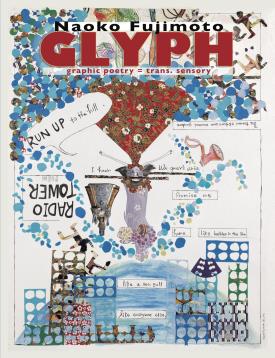 The picture scroll in Japanese is Emaki (eh-MA-kee) and the style has been popular since the 7-16th centuries in Japan. It is still a widely recognized art style in Japan and the rest of the world. Emaki is akin to a current graphic novel / poetry / comic. One of the most famous Emaki is the Tale of Genji, which is a fictional (perhaps gossip) story about a handsome son of the emperor.
The picture scroll in Japanese is Emaki (eh-MA-kee) and the style has been popular since the 7-16th centuries in Japan. It is still a widely recognized art style in Japan and the rest of the world. Emaki is akin to a current graphic novel / poetry / comic. One of the most famous Emaki is the Tale of Genji, which is a fictional (perhaps gossip) story about a handsome son of the emperor.
The graphic poetry project is also meant for the viewer to transport their senses from the flat paper and bridge the gap between words and images that will connect with their physical counterparts. Like a historical Emaki, there are side stories hidden behind some of the main graphic narratives— be they comedic or serious— for audiences to interpret. All of the details (choice of words, origami paper, or styles) have a specific meaning to contribute to the whole.
In June, 2016, Naoko Fujimoto decided to take a year off to be a full-time poet and artist. People around her asked why she was leaving a stable job, and if she was going to be a starving artist. She wanted to find out how far she can succeed as a poet and artist. After all, if she gets lost, she can just come back to what worked before.
During the year, she had opportunities to not only read books, but also explore and live with classic and contemporary works, such as the Massachusetts Museum of Contemporary Art, Metropolitan Museum of Art, San Francisco Museum of Modern Art, Art Institute of Chicago, Tokugawa Museum, and Museum of Contemporary Art Tokyo. There, she revisited her idea of how she could create an effective melding of poetry and art; perhaps, words and images.
The following, entitled “The Duck’s Smile”, was her first attempt. She wrote an original poem for a project named, “Killing Sally McHill”, which was a protest against common violence hidden around the house, school, office, and society. “The Duck’s Smile” was specifically written about a hierarchy in a small community between the narrator and Sally. Her first graphic poem adapted a written poem into a graphic narrative. The poem started from the top left corner and progressed to the bottom right. It took a simple black and white art approach, but did not quite embody how she wanted it to be represented.
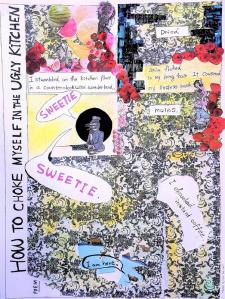 Naoko Fujimoto researched art works of inclusions of “word” and “image” such as László Moholy-Nagy, Hiroshige Utagawa, William Blake, Francisco Goya, and many other writers and artists. Then when she observed works by a German painter and sculptor, Anselm Kiefer, she understood that poetry must have explosions of creativity. Coincidentally, she had the chance to attend a workshop with Robin Coste Lewis, who critiqued the poems to be tight in structure, but reminded to forget about grammar and rules from time to time to experiment freely.
Naoko Fujimoto researched art works of inclusions of “word” and “image” such as László Moholy-Nagy, Hiroshige Utagawa, William Blake, Francisco Goya, and many other writers and artists. Then when she observed works by a German painter and sculptor, Anselm Kiefer, she understood that poetry must have explosions of creativity. Coincidentally, she had the chance to attend a workshop with Robin Coste Lewis, who critiqued the poems to be tight in structure, but reminded to forget about grammar and rules from time to time to experiment freely.
So she chose to adapt a traditional Japanese Emaki style (an illustrated narrative art). The original poem was carefully scattered specific phrases or implied images were selected, with the rest being ignored (like the poetry erasure technique). She traveled to find paper and objects, such as supermarket advertisements, birthday gift wrapping, postcards, origami, magazines, and other materials rich in color and texture. She wrote about relatable life conflicts, so using common objects in turn grounded her graphic poetry.
Naoko Fujimoto was born and raised in Nagoya, Japan. She studied at Nanzan Junior College and received BA and Master’s degrees from Indiana University. Recent work appears or is forthcoming in POETRY, Kenyon Review, Seattle Review, Quarterly West, North American Review, Hayden’s Ferry Review, Prairie Schooner, Crazyhorse, and The Arkansas International. She is the author of Glyph:Graphic Poetry=Trans. Sensory (Tupelo Press, 2021), Where I Was Born (Willow Publishing, 2019), and three chapbooks. She is an associate & outreach translation editor at RHINO Poetry. (naokofujimoto.com)
Glyph: Graphic Poetry=Trans. Sensory
by Naoko Fujimoto
Published: June 2021
ISBN: 978-1-946482-52-5
Publisher: Tupelo Pess
1st edition (June 1, 2021)
Language : English
Paperback
64 pages
ISBN-10 : 1946482528
ISBN-13 : 978-1946482525
$21.95
# new poetry
Naoko Fujimoto
Glyph: Graphic Poetry=Trans. Sensory
• fleursdumal.nl magazine
More in: #Archive Concrete & Visual Poetry, *Concrete + Visual Poetry K-O, - Book News, Archive E-F, Archive E-F, Art & Literature News, AUDIO, CINEMA, RADIO & TV, MUSEUM OF LOST CONCEPTS - invisible poetry, conceptual writing, spurensicherung, Visual & Concrete Poetry

The Foundling
Beautiful Mother, I have toiled all day;
And I am wearied. And the day is done.
Now, while the wild brooks run
Soft by the furrows–fading, gold to gray,
Their laughters turned to musing–ah, let me
Hide here my face at thine unheeding knee,
Beautiful Mother; if I be thy son.
The birds fly low. Gulls, starlings, hoverers,
Along the meadows and the paling foam,
All wings of thine that roam
Fly down, fly down. One reedy murmur blurs
The silence of the earth; and from the warm
Face of the field the upward savors swarm
Into the darkness. And the herds are home.
All they are stalled and folded for their rest,
The creatures: cloud-fleece young that leap and veer;
Mad-mane and gentle ear;
And breath of loving-kindness. And that best,–
O shaggy house-mate, watching me from far,
With human-aching heart, as I a star–
Tempest of plum’d joys, just to be near!
So close, so like, so dear; and whom I love
More than thou lovest them, or lovest me.
So beautiful to see,
Ah, and to touch! When those far lights above
Scorch me with farness–lights that call and call
To the far heart, and answer not at all;
Save that they will not let the darkness be.
And what am I? That I alone of these
Make me most glad at noon? That I should mark
The after-glow go dark?
This hour to sing–but never have–heart’s-ease!
That when the sorrowing winds fly low, and croon
Outside our happy windows their old rune,
Beautiful Mother, I must wake, and hark?
Who am I? Why for me this iron Must?
Burden the moon-white ox would never bear;
Load that he cannot share,
He, thine imperial hostage of the dust.
Else should I look to see the god’s surprise
Flow from his great unscornful, lovely eyes–
The ox thou gavest to partake my care.
Yea, all they bear their yoke of sun-filled hours.
I, lord at noon, at nightfall no more free,
Take on more heavily
The yoke of hid, intolerable Powers.
–Then pushes here, in my forgetful hand,
This near one’s breathless plea to understand.
Starward I look; he, even so, at me!
And she who shines within my house, my sight
Of the heart’s eyes, my hearth-glow, and my rain,
My singing’s one refrain–
Are there for her no tidings from the height?
For her, my solace, likewise lost and far,
Islanded with me here, on this lone star
Washed by the ceaseless tides of dark and light.
What shall it profit, that I built for her
A little wayside shelter from the stark
Sky that we hear, and mark?
Lo, in her eyes all dreams that ever were!
And cheek-to-cheek with me she shares the quest,
Her heart, as mine for her, sole tented rest
From light to light of day; from dark–till Dark.
Yea, but for her, how should I greatly care
Whither and whence? But that the dark should blast
Our bright! To hold her fast,–
Yet feel this dread creep gray along the air.
To know I cannot hold her so my own,
But under surge of joy, the surges moan
That threaten us with parting at the last!
Beautiful Mother, I am not thy son.
I know from echoes far behind the sky.
I know; I know not why.
Even from thy golden, wide oblivion:
Thy careless leave to help thy harvesting,
Thy leave to work a little, live, and sing;
Thy leave to suffer–yea, to sing and die,
Beautiful Mother! …
Ah, Whose child am I?
Love sang to me. And I went down the stair,
And out into the darkness and the dew;
And bowed myself unto the little grass,
And the blind herbs, and the unshapen dust
Of earth without a face. So let me be.
For as I hear, the singing makes of me
My own desire, and momently I grow.
Yea, all the while with hands of melody,
The singing makes me, out of what I was,
Even as a potter shaping Eden clay.
Ever Love sings, and saith in words that sing,
‘Beloved, thus art thou; and even so
Lovely art thou, Beloved!’–Even so,
As the Sea weaves her path before the light,
I hear, I hear, and I am glorified.
Love sang to me, and I am glorified
Because of some commandment in the stars.
And I shall grow in favour and in shining,
Till at the last I am all-beautiful;
Beautiful, for the day Love sings no more.
Josephine Preston Peabody
(1874 – 1922)
The Foundling
• fleursdumal.nl magazine
More in: # Classic Poetry Archive, Archive O-P, Archive O-P
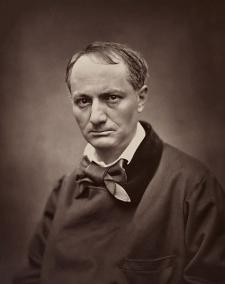
Le Beau Navire
Je veux te raconter, ô molle enchanteresse!
Les diverses beautés qui parent ta jeunesse;
Je veux te peindre ta beauté,
Où l’enfance s’allie à la maturité.
Quand tu vas balayant l’air de ta jupe large,
Tu fais l’effet d’un beau vaisseau qui prend le large,
Chargé de toile, et va roulant
Suivant un rythme doux, et paresseux, et lent.
Sur ton cou large et rond, sur tes épaules grasses,
Ta tête se pavane avec d’étranges grâces;
D’un air placide et triomphant
Tu passes ton chemin, majestueuse enfant.
Je veux te raconter, ô molle enchanteresse!
Les diverses beautés qui parent ta jeunesse;
Je veux te peindre ta beauté,
Où l’enfance s’allie à la maturité.
Ta gorge qui s’avance et qui pousse la moire,
Ta gorge triomphante est une belle armoire
Dont les panneaux bombés et clairs
Comme les boucliers accrochent des éclairs;
Boucliers provoquants, armés de pointes roses!
Armoire à doux secrets, pleine de bonnes choses,
De vins, de parfums, de liqueurs
Qui feraient délirer les cerveaux et les coeurs!
Quand tu vas balayant l’air de ta jupe large
Tu fais l’effet d’un beau vaisseau qui prend le large,
Chargé de toile, et va roulant
Suivant un rythme doux, et paresseux, et lent.
Tes nobles jambes, sous les volants qu’elles chassent,
Tourmentent les désirs obscurs et les agacent,
Comme deux sorcières qui font
Tourner un philtre noir dans un vase profond.
Tes bras, qui se joueraient des précoces hercules,
Sont des boas luisants les solides émules,
Faits pour serrer obstinément,
Comme pour l’imprimer dans ton coeur, ton amant.
Sur ton cou large et rond, sur tes épaules grasses,
Ta tête se pavane avec d’étranges grâces;
D’un air placide et triomphant
Tu passes ton chemin, majestueuse enfant.
Charles Baudelaire
(1821 – 1867)
Le Beau Navire
Fleurs du mal (Flowers of Evil)
• fleursdumal.nl magazine
More in: Archive A-B, Archive A-B, Baudelaire, Les Fleurs du Mal
Vanwege de roem die hem al bij leven ten deel viel, weten we over Dante Alighieri (ca. 1265 – 1321) meer dan over de meeste van zijn tijdgenoten.
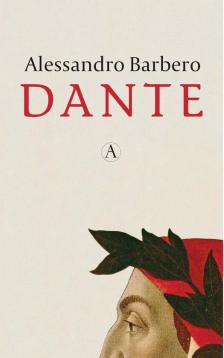 We volgen de later wereldberoemde dichter vanaf zijn adolescentie: als de zoon van een woekeraar, die ervan droomt tot de wereld van edelen en schrijvers te behoren. We zien hem in de donkere wandelgangen van de corrupte politiek en tijdens zijn ballingschap, waarin hij de verscheidenheid van veertiende-eeuws Italië ontdekt.
We volgen de later wereldberoemde dichter vanaf zijn adolescentie: als de zoon van een woekeraar, die ervan droomt tot de wereld van edelen en schrijvers te behoren. We zien hem in de donkere wandelgangen van de corrupte politiek en tijdens zijn ballingschap, waarin hij de verscheidenheid van veertiende-eeuws Italië ontdekt.
Historicus Alessandro Barbero plaatst de schepper van De goddelijke komedie in zijn tijd, cultuur en maatschappelijke context. Dante is daarmee niet alleen een portret van een dichter; het boek biedt een volledig beeld van een man die vat probeert te krijgen op macht, geld, oorlog, familie, vriendschap en liefde.
Alessandro Barbero is een van de vooraanstaandste historici van Italië. Zijn werk wordt internationaal gepubliceerd. Hij doceert Middeleeuwse Geschiedenis aan de universiteit van Piedmont Orientale in Vercilli. Tot zijn bekendste werken behoren Waterloo en Het mooie leven en de oorlogen van anderen, waarvoor hij de Premio Strega ontving.
#new books
Dante
Alessandro Barbero
Vertaler: Etta Maris
Paperback
Ingenaaid
Nederlands
Uitgever Athenaeum
Druk 1
Verschenen sep. 2021
Bladzijden: 384
Genre: Biografieen literaire auteurs
EAN 9789025313432
Afmetingen 216 x 136 x 31 mm
€ 27,50
• fleursdumal.nl magazine
More in: #Biography Archives, - Book News, Archive A-B, Archive C-D, Archive C-D, Dante Alighieri, MONTAIGNE, TOMBEAU DE LA JEUNESSE - early death: writers, poets & artists who died young
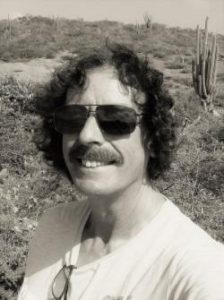
De Overgang
M.S.
Jij nooit ver, je vader vol soldatenzeer
van verre als versteende wortel in het hoofd.
Nu ook niet meer dichtbij, zo dicht
bij waar je ons tot verliezens toe dronk,
voor het eerst schonk wat je zelf steeds eiste.
Klokkend was de stilte na de lessen in dit bos
aan het spoor, op varens en zachte naalden.
Hier was het ook dat jij tussen de rails
nog net je armen spreidde, het kruis werd
dat je veertig jaar, met en zonder medicijnen,
in licht en schaduw van andere mannen,
van huis naar huis naar tehuis mee moest slepen.
Geluk wellicht nog in die allerlaatste flits,
in het geraas door je ooit zo lenige botten,
door je zo hevig verlangende vlees,
door de geest van je enig kind,
door je enige liefde
die bleef.
Albert Hagenaars
Verboden Terrein
Gedichten
# new poetry
by Albert Hagenaars
Pelgrimsgrond
Gedichten
Uitgeverij In de Knipscheer
ISBN 978-94-93214-32-3
84 pagina’s
Prijs ca. € 17,50
Verschijnt begin 2022
• Albert Hagenaars (Bergen op Zoom, 1955) was aanvankelijk werkzaam als beeldend kunstenaar en galeriehouder. Hij studeerde Nederlands en bracht veel tijd in Frankrijk door. In 1980 koos hij voor de literatuur. Werk van zijn hand verscheen in talrijke bladen en bloemlezingen, waaronder Maatstaf, De Tweede Ronde, Literair Akkoord, Raster, Poëziekrant en ‘De Nederlandse poëzie van de negentiende en twintigste eeuw in 1000 en enige gedichten’. Behalve gedichten, romans en vertalingen schrijft hij ook kritieken over literatuur en moderne beeldende kunst voor tal van bladen. Hagenaars werkt vaak samen met kunstenaars en musici en ook met collega’s uit andere taalgebieden. Enkele van zijn boeken werden vertaald; in het Duits, Frans, Indonesisch en Roemeens. Enkele componisten maakten muziek bij werk van Albert Hagenaars. Hagenaars maakte veel reizen, door o.a. de Verenigde Staten, Latijns-Amerika en het Verre Oosten. De laatste jaren woont hij deels in Indonesië, het geboorteland van zijn vrouw, Siti Wahyuningsih, met wie hij al ruim 200 Nederlandstalige gedichten van bekende en onbekende auteurs in Bahasa Indonesia vertaalde en publiceerde. Begin 2022 verschijnt een nieuwe bundel: Pelgrimsgrond bij Uitgeverij In de Knipscheer (meer informatie op website: www.alberthagenaars.nl)
• fleursdumal.nl magazine
More in: - Book News, Archive G-H, Archive G-H, Hagenaars, Albert

A Dream
I heard the dogs howl in the moonlight night;
I went to the window to see the sight;
All the Dead that ever I knew
Going one by one and two by two.
On they pass’d, and on they pass’d;
Townsfellows all, from first to last;
Born in the moonlight of the lane,
Quench’d in the heavy shadow again.
Schoolmates, marching as when they play’d
At soldiers once, but now more staid;
Those were the strangest sight to me
Who were drown’d, I knew, in the awful sea.
Straight and handsome folk, bent and weak, too;
Some that I loved, and gasp’d to speak to;
Some but a day in their churchyard bed;
Some that I had not known were dead.
A long, long crowd, where each seem’d lonely,
Yet of them all there was one, one only,
Raised a head or look’d my way;
She linger’d a moment, she might not stay.
How long since I saw that fair pale face!
Ah! Mother dear! might I only place
My head on thy breast, a moment to rest,
While thy hand on my tearful cheek were prest!
On, on, a moving bridge they made
Across the moon-stream, from shade to shade,
Young and old, women and men;
Many long-forgot, but remembered then,
And first there came a bitter laughter;
A sound of tears a moment after;
And then a music so lofty and gay,
That eve morning, day by day,
I strive to recall it if I may.
William Allingham
(1824 – 1889)
A Dream
• fleursdumal.nl magazine
More in: Allingham, William, Archive A-B, Archive A-B
Jim Harrison: Complete Poems is the definitive collection from one of America’s iconic writers.
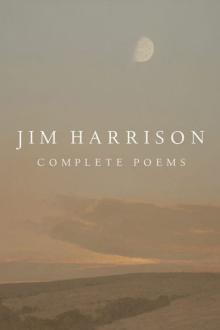 Introduced by activist and naturalist writer Terry Tempest Williams, this tour de force contains every poem Harrison published over his fifty-year career and displays his wide range of poetic styles and forms. Here are the nature-based lyrics of his early work, the high-velocity ghazals, a harrowing prose-poem “correspondence” with a Russian suicide, the riverine suites, fearless meditations inspired by the Zen monk Crazy Cloud, and a joyous conversation in haiku-like gems with friend and fellow poet Ted Kooser.
Introduced by activist and naturalist writer Terry Tempest Williams, this tour de force contains every poem Harrison published over his fifty-year career and displays his wide range of poetic styles and forms. Here are the nature-based lyrics of his early work, the high-velocity ghazals, a harrowing prose-poem “correspondence” with a Russian suicide, the riverine suites, fearless meditations inspired by the Zen monk Crazy Cloud, and a joyous conversation in haiku-like gems with friend and fellow poet Ted Kooser.
Weaving throughout these 1000 pages are Harrison’s legendary passions and appetites, his love songs and lamentations, and a clarion call to pay attention to the life you are actually living. The Complete Poems confirms that Jim Harrison is a talented storyteller with a penetrating eye for details, or as Publishers Weekly called him, “an untrammeled renegade genius… a poet talking to you instead of around himself, while doing absolutely brilliant and outrageous things with language.”
Jim Harrison (1937–2016) was the author of over three dozen books, including Legends of the Fall and Dalva, and served as the food columnist for the magazines Brick and Esquire.
He published fourteen volumes of poetry, the final being Dead Man’s Float (2016). His work has been translated into two dozen languages and produced as four feature-length films. As a young poet he co-edited Sumac magazine with fellow poet Dan Gerber, and earned fellowships from the National Endowment for the Arts and the Guggenheim Foundation.
In 2007, he was elected into the Academy of American Arts and Letters. Regarding his most beloved art form, he wrote: “Poetry, at its best, is the language your soul would speak if you could teach your soul to speak.” Jim Harrison certainly spoke the language.
#new poetry
Complete Poems
by Jim Harrison
Joseph Bednarik (Editor)
Terry Tempest Williams (Introduction)
Format: Hardcover
Publisher: Copper Canyon Press
December 7, 2021
Language: English
944 pages
ISBN-10: 155659593X
ISBN-13: 978-1556595936
$40.00 list price
• fleursdumal.nl magazine
More in: #Editors Choice Archiv, - Book News, - Bookstores, Archive G-H, Archive G-H
Thank you for reading Fleurs du Mal - magazine for art & literature